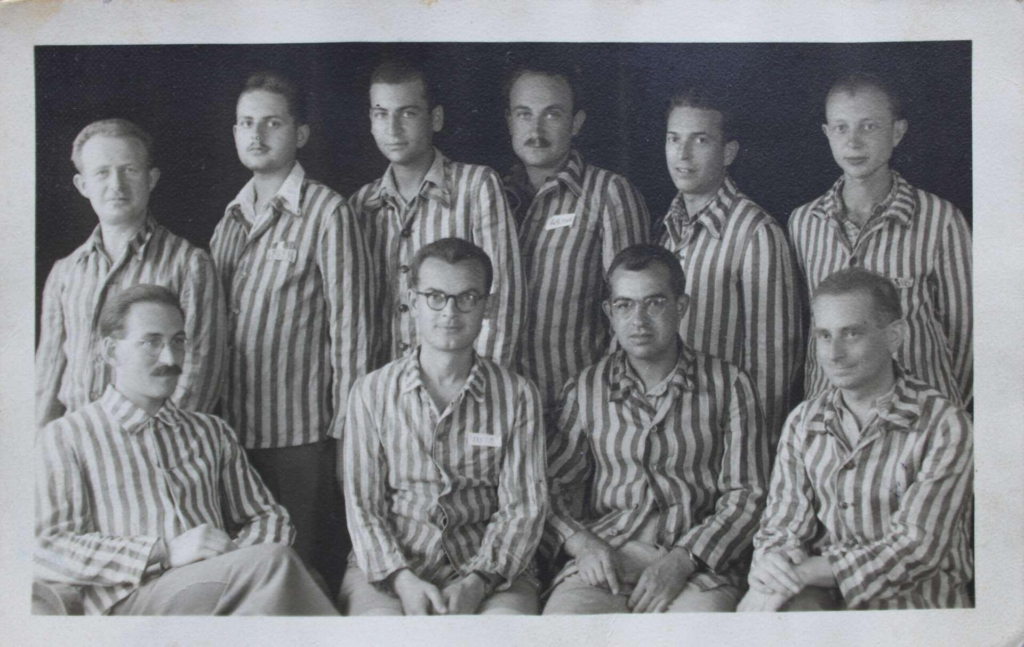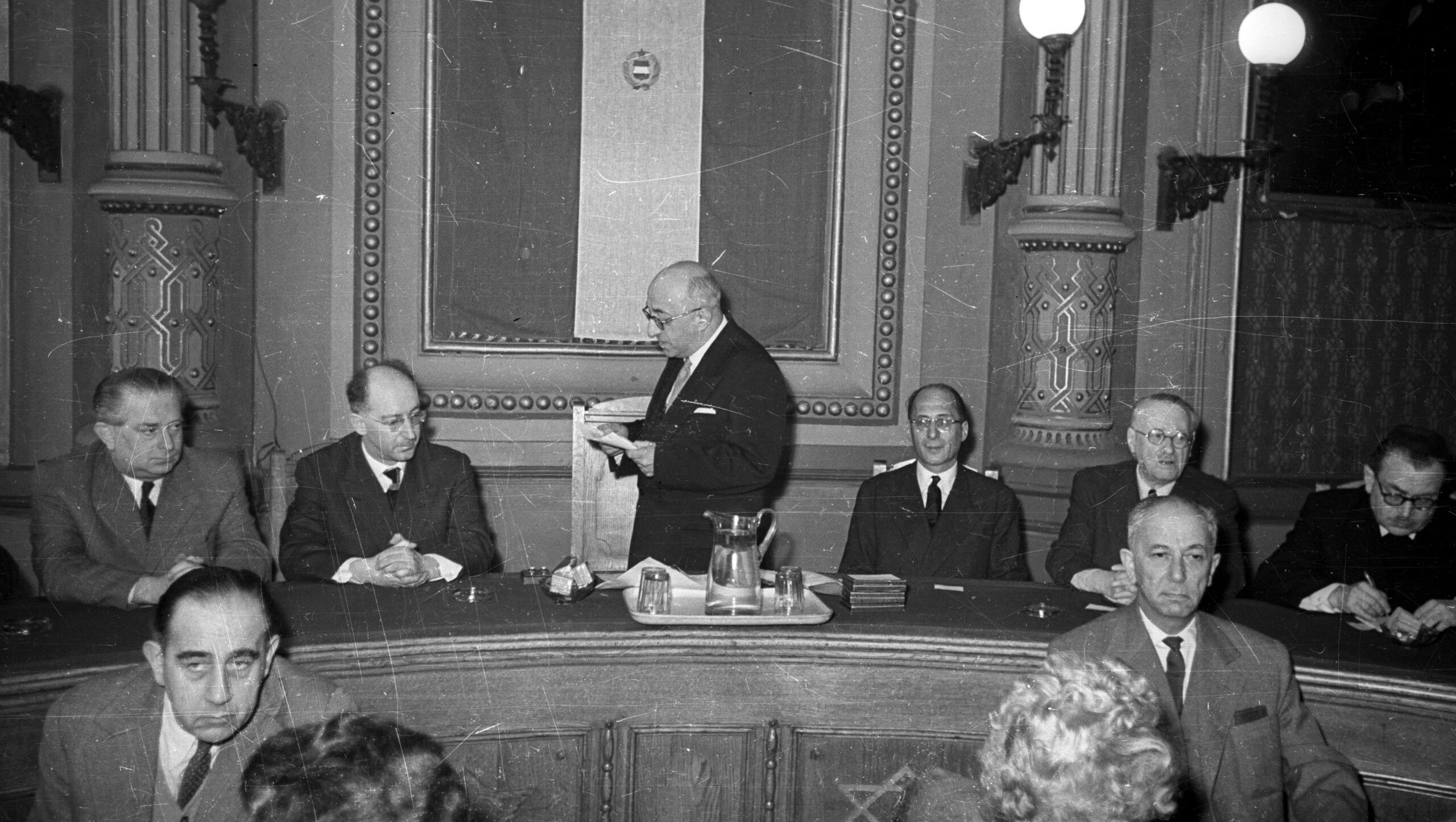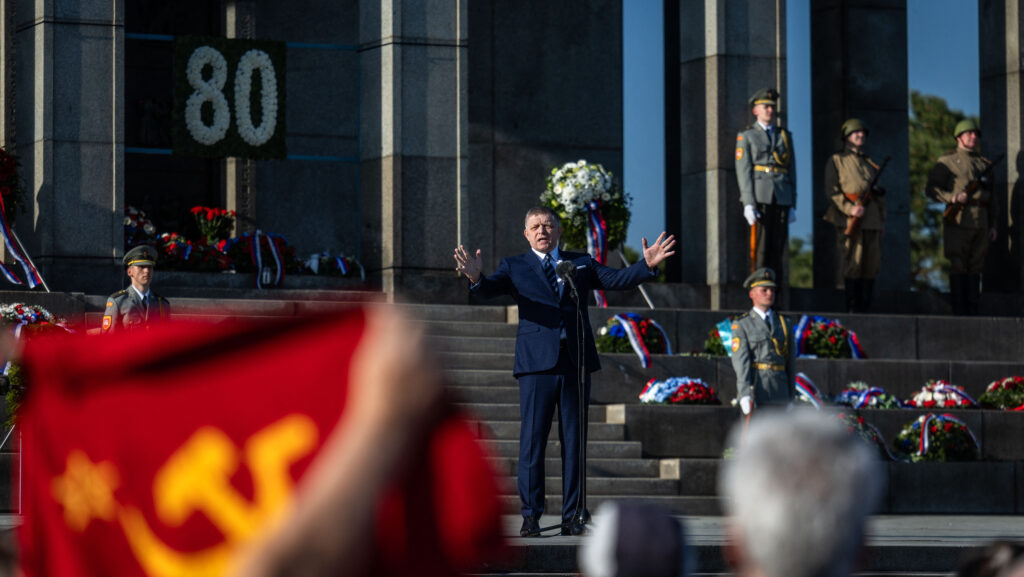Although his name has largely faded into obscurity, Mihály Borsa (1906–1986), chairman of the Central Social Committee (KSZB) of MIOK (Magyarországi Izraeliták Országos Képviselete, that is, National Representation of Hungarian Israelites), was once an indispensable figure in the life of Hungarian Jewry. Borsa was an influential member of the Jewish community and, from 1962 onward, chaired the KSZB—an organization through which the Joint, via a Swiss intermediary (the Société de Secours et d’Entr’Aide, or SSEA), supported Holocaust survivors and socially vulnerable members of the Hungarian Jewish population. Some documents concerning Borsa’s surveillance were published by historian András Kovács in a 2019 source edition, but the full body of material related to Borsa has not yet been processed.[1]
Borsa first came to the attention of state security in 1960, and from 1962 onward, he became a target of internal counterintelligence under the code name ‘Milliomos’ (Millionaire). Initially, he was monitored within the group file titled ‘Együttműködők’ (The Collaborators), and later a personal file was opened on him. The ‘Milliomos’ case file has survived in three folders in the Historical Archives of the State Security Services, totaling 348, 277, and 187 pages. A range of covert measures and agents were deployed to surveil him, including operational actions and, eventually, a criminal proceeding—all aimed at removing him from his key position in the Jewish community leadership, though these efforts ultimately failed.[2]
Borsa was born in 1906 in Győr, under the name Glück. He attended the local Jewish community elementary school, then, after a brief period of study in France, earned a law degree in Pécs. He worked as a journalist and served as a legal clerk at the Győr Chamber of Commerce until he lost his position in 1939 due to the anti-Jewish laws. Following the German occupation of Hungary, he was among the first to be deported—likely deemed politically dangerous because of his connections to the Smallholders’ Party. He was sent first to Auschwitz, then to Dachau. During the deportations, he lost his wife and young son—an emotional wound he never fully recovered from. He did not remarry until the last years of his life.
After the liberation Borsa became a member of the National Assembly and a ministerial adviser for the Independent Smallholders’ Party. He later joined the Joint and eventually the KSZB. During his brief political career, he established a network of connections that he continued to draw on throughout his life. One of his main patrons was the influential communist politician Gyula Ortutay, who often stood up for his former party colleague. In 1963, for instance, MIOK president Endre Sós complained to the State Office for Church Affairs (ÁEH) that he had run into Ortutay at the airport, where the latter, half-jokingly, half-seriously remarked: ‘I hear you’ve been giving my friend Miska a hard time. Now, now!’[3]
One of the first reports on Borsa was filed in April 1960 by an informant codenamed ‘Xavér’. According to the report, Borsa was ‘a cheerful, good-humored, bohemian man who enjoys living well and merrily…He likes women and often boasts about his successes with them.’ His relationship with the communist leadership of the Jewish community—particularly with Sós—was notably poor, but they were unable to remove him from his position.
By February 1961 Borsa had again come under the scrutiny of state security, this time for allegedly receiving lenient treatment during customs checks at the airport—he was said to have many friends among the customs officers. Additionally, ‘he has a very favourable standing with the State Office for Church Affairs, even they do not monitor him.’ An agent codenamed ‘Sárosi’ (identified in the scholarly literature as Géza Seifert, former leading member of the Budapest Israelite Congregation and later, after Sós, president of MIOK[4]) criticized Borsa for sitting in the back during MIOK general assemblies, chatting and laughing—thus ‘disrupting’ the proceedings. Borsa was reportedly fond of boasting about his high-level communist connections, often saying: ‘The members of the Political Committee stand behind me.’ A state security officer added a question mark next to this remark in the file. Borsa allegedly named his connections, including not only Ortutay but also Rezső Nyers, the influential Minister of Finance. Although their names were later crossed out in the documents, they remain legible.
A greater problem than the above-mentioned issues was Borsa’s alleged Zionist connections and his friendship with Rabbi Sándor Scheiber. ‘Mihály Borsa fully cooperates with the staunch Zionist Sándor Scheiber,’ wrote one state security officer in a comment. Additionally, Borsa had control over significant sums of money: his organization officially distributed one million dollars annually, or 30 million Hungarian forints at the time’s value—a huge sum. However, Borsa boasted in one instance that through other channels, he brought in at least double that amount. ‘He brings in the most dollars, more than any foreign trade company’ and ‘the Party also highly appreciates this activity.’ ‘He is actually at the head of a state office—it’s just a coincidence that this office is located in the headquarters of the Jewish Community’—one agent quoted his words. The Ministry of Interior’s II/5 Department was primarily concerned that the vast sums of money ‘were not properly monitored due to a lack of agency (ie agents)’, and ‘since the aid provided could potentially finance hostile activities, it became necessary to bring the KSZB’s activities under supervision.’
‘He brings in the most dollars, more than any foreign trade company’
One of the first covert measures taken against Borsa was the organization of his street surveillance. According to the first report from 24 January 1962, ‘Milliomos’ was described as a 50–52-year-old man, approximately 165–167 cm tall, with light brown, heavily graying hair, balding, a round face, slightly swollen nose, thick lips, a rounded chin, and a stocky build, walking quickly. That day, he wore a white shirt, a gray patterned tie, a gray suit, a gray winter coat, and black shoes. He first left his apartment on Belgrád Quay to go to work, then drove his cream-colored Peugeot from his workplace at Síp Street 12 to the university, and from there to the Malév office. He then visited a deli (which they did not follow him to). Afterward, he returned to his workplace with 3–4 bottles of wine, had lunch at a restaurant, and stayed there until the afternoon. From there, he drove to the Ministry of Culture, then to the Royal Hotel, where he picked up a letter at the reception. Finally, he dined at the Szófia restaurant and returned home at 10:30pm, at which point the surveillance was discontinued.
There are dozens of such reports in his file. However, the surveillance only revealed self-evident connections, such as Erwin Haymann, the head of the Swiss Jewish aid organization. In March 1962 the Ministry of Interior’s II/5 Department was forced to conclude that ‘as a result of the external surveillance measures introduced, aside from a few of his connections, we were unable to establish any significant events. A serious shortcoming on the part of the II/2 Department was that they did not place Dr Ervin Heymann (sic!) in a room equipped with technical surveillance, so we were unable to obtain any information about possibly more interesting conversations he had with Dr Borsa. It should be noted that we requested the timely handling of the aforementioned matters via official channels.’
The next step was to bug his office (a so-called ‘3/e procedure’). According to a report from 3 August 1962 ‘with the legalization (ie “legend”, or cover) of fire safety authorities, we conducted an onsite inspection of the BIH office premises—Budapest, VII, Síp Street 12—so that we could carry out the technical installation at a later time in the office of the KSZB leader…The operation was carried out smoothly, without any disruption, and we achieved the assigned task.’ The 3/e procedure was successfully installed in the early hours of 31 August 1962, at ‘Milliomos’s’ office. It was clear that they were already considering a secret search of the office, as they received a detailed description of the office layout from ‘Sárosi’, whose handler found this report operationally valuable and instructed the agent to build a friendly relationship with Borsa.
There were differences in the assessment of Borsa between various state agencies. Just as the counterintelligence concluded that Borsa was ‘suspected of intelligence activities’, the ÁEH issued the following evaluation: ‘[Borsa] is not a Zionist. His public activities are well-known, and he has always shown loyalty to our government and system.’[5] However, the most accurate description of his philosophy was perhaps found in the following report: ‘He is a supporter of this system because he cannot do otherwise. First of all, he is living better than he ever has. No one bothers him, no one disturbs him, so he has no reason for dissatisfaction. Additionally, he admits that he is afraid. Every Jew is afraid, though not all admit it. He is afraid because if any change were to happen here, even if only a 2–3-day period of chaos and transition were to occur, all Jews would be exterminated in that time. The level of antisemitism is so great, without reason, as it has never been anywhere else. Without reason, because during Rákosi’s time, it was justified, as the highest leadership was made up entirely of Jews, although these individuals had nothing to do with Judaism, and their crimes were attributed to the Jewish community. But today, this is not the case. The highest leadership has no Jews, but the antisemitism has not disappeared; in fact, it has intensified.’ It was clear that internal security was disturbed by the fact that Borsa had high-level connections, so, in the course of their covert investigation of him, they gathered information on Ortutay, the leaders of the ÁEH, and other state and party officials in key positions.
Since the previous investigations did not yield results, a year later, they planned to install a bug in Borsa’s apartment. To do so, they first needed a copy of his apartment key. Since Borsa regularly visited the Rudas Bath with Géza Seifert, it seemed logical to steal the keys from his clothing at that time. The internal security service therefore contacted the police and found a suitable candidate from the staff who appeared capable of carrying out the task. ‘The operative contact can assign himself to a cabin at the baths. This would give him the opportunity to obtain the keys from Borsa’s clothing after he leaves and hand them over to us for copying purposes.’ To carry out the operation, they mobilized their agent, ‘Sárosi’, whose job was to ensure that Borsa did not cut his bath visit short that day. The ‘3/e procedure’, that is, the bug was finally installed in his apartment in February 1964.
Starting in April 1964, they began monitoring Borsa’s foreign and domestic correspondence as well. The more interesting letters were carefully opened and photographed using sophisticated techniques. Yet, the most amateurish note in the three files actually comes from the photography of these letters. On several photographed letters, there were crossed-out parts, and the secret police clearly wanted to know what had been removed. As a result, the Ministry of Interior’s III/V-2-a division (chemistry, printing technology) had to explain that a developed photo was made from a single material, and only from the original letter could they have separated the different materials. More specifically: ‘Regarding the 18 photocopies sent for examination by the III/II-5-a division, our expert opinion is as follows: the readability of crossed-out or otherwise covered writings can only be achieved if the material used for writing has a different physical or chemical property from that used for covering. A photocopy made from such covered text, however, contains none of the original material’s properties; the image consists solely of silver metal. Therefore, the requested task, ie, deciphering the parts of the covered text, cannot be accomplished based on the photocopies sent.’ It is astonishing that this needed to be explained to anyone at the Kádár regime’s secret service.

Despite the above, this was still not the peak of the hunt against Borsa. In the summer of 1964 he visited Poland, and at that time, the Polish state security services were asked to monitor him, but no significant data was gathered. The Hungarian authorities also reached out to the Soviet intelligence services, but for a more sinister matter: they wanted to find out the names of Holocaust survivors living in the Soviet Union who had been imprisoned alongside Borsa in Dachau and other camps. The Hungarian authorities believed that Borsa had been a cruel kapo (a prisoner appointed as a supervisor in concentration camps), and they were seeking evidence to support this. The tip had originally come from ‘Xavér’, whom Borsa had confided in during 1957–58, telling her that ‘he had been a kapo in the concentration camp. This came up when Borsa shared a long story about how he acquired a lot—perhaps 2,000 pieces—of cigarettes and how he manipulated them. He couldn’t have done this any other way, except by having a special position. If I remember correctly, he mentioned Wüstegiersdorf as the camp where he had been. I think he was also in Dachau.’ The testimonies were continuously collected, even as late as 1968, with the aim of discrediting Borsa, though it seems the case never led to any conclusive findings, other than that he was most likely indeed a kapo. Of course, being a kapo didn’t necessarily imply that he was also cruel, and we know that the communist secret police often spread false accusations of collaboration against their Jewish enemies.
In the summer of 1965 the state security concluded that more intensive data collection was needed regarding Borsa’s ‘business’ meetings. They decided to bug the 4th booth at the famous Mátyás Pince restaurant, which was known to be reserved for Borsa. This was a complicated operation, as the secret police needed unrestricted movement for an extended period just to carry out the preliminary checks. At the time, an agent codenamed ‘Pincér’ (‘Waiter’), worked at the restaurant—in reality, he was Miklós Oltai, a former Jewish unarmed labour service member, born in 1916, also a party member, and a ‘workers’ guard’ (munkásőr) since 1957. He assisted in allowing the technical team to carry out the necessary checks during the night. Thanks to his help, they successfully installed the surveillance device at the end of July. However, by October, it was determined to be completely useless because noise from the bathroom interfered with the operation. The device had to be removed, which required another lengthy procedure and a special operation.
‘We know that the communist secret police often spread false accusations of collaboration against their Jewish enemies’
Shortly before this, Borsa underwent a ‘strict customs inspection’ at Ferihegy airport, but nothing unusual was found. He was mainly carrying Herendi porcelain worth 5,000 forints, which, although not insignificant, was not technically illegal. A secret search was also conducted at his residence, but it yielded no results. The items on his desk were so specifically arranged that it was impossible to examine the correspondence without the risk of compromising its confidentiality. However, while they were there, they took a photograph of his phone book.
In May 1966, through the examination of his contacts, it was established as a fact that Borsa was in contact with individuals who, according to information, could be agents of British intelligence or NATO intelligence, although the Joint was considered a cover operation of the Israeli intelligence service anyway. ‘Considering the above, Dr Mihály Borsa is highly suspected of involvement in intelligence activities, and thus his activities require further monitoring,’ Police Captain Ferenc Kelencz stated, despite the total lack of results.
They also collected a few incriminating quotes from him: at one point, Borsa said: ‘I hate the communists’, and at another, he remarked: ‘There is no worse institution than the ÁEH. They turn people against each other. They don’t care about the Jewish issue…an anti-Semitic group.’ ‘He then elaborated that one should only live among Jews, but added that, of course, not among the kind of Jews that live in Hungary.’
It was at this point that they decided to open a separate file on him under the codename ‘Millionaire’. The secret police proposed a whole series of measures against him: renewed monitoring of his postal correspondence, installation of new surveillance devices, a ‘body search’ (that is, examining his clothes while he was bathing), further investigation into his conduct during the Holocaust, recruiting an informant from his block of flats, secret searches of both his workplace and residence, checking the background of his acquaintances, and monitoring his relationships with women. For one particular acquaintance, they even considered cooperating with the Bulgarian state security.
In August 1966, using phone surveillance, they noted that Borsa frequently mentioned receiving ‘cheese’ and ‘cigars’ from abroad. This raised the suspicion that the terms ‘cheese’ and ‘cigar’ might be code words. To clarify this, they planned the following operation: ‘We will have agent “Sárosi” invite him to dinner, where a few varieties of cheese will be served as starters. This will allow us to assess the meaning of “cheese”. The agent will be specially briefed for this.’
The above operation involving ‘cheese analysis’ might even seem comical—though unfortunately, the results of agent ‘Sárosi’s’ test are not known. But there was nothing funny about the developments in the case in 1968. On 1 February of that year, Borsa was driving with his acquaintance, Béla Steiner, near Dunaújváros. He was behind the wheel when the car suddenly skidded off the road into a ditch. Steiner died in the crash. Criminal proceedings were launched against Borsa for negligent endangerment causing death. Behind the scenes, Department III/II-4-a of the Interior Ministry (counterintelligence focused on foreign entities from the Middle East) intervened to ‘ensure that no external interference would be allowed and that the investigation and legal proceedings would be conducted at the prosecutorial and judicial level with strict adherence to socialist legality.’
There are signs they tried to influence the findings of the expert opinion on the accident, although primarily because Borsa himself had started using his connections in the matter. According to agent ‘Sárosi’, Borsa mobilized Ortutay, but as the report contained the names of ‘leading comrades’, ‘Sárosi’ was instructed not to write this down but only to report it verbally. At this point, it was likely someone from higher up who ordered the secret police to stop the pointless harassment of Borsa. Investigators were instructed that if Borsa had committed a crime, then the criminal proceedings should be ‘realized’, but if not, then ‘the case must be closed’. In the end, Borsa received a three-year suspended prison sentence for the traffic accident, and his file was closed—with the caveat that he would still be subject to ‘periodic monitoring’ through the bug installed in his apartment and via agents ‘Sárosi’ and ‘Sárvári’. The secret police were forced to acknowledge, however, that over the course of eight years of operative work, they had ‘not succeeded in obtaining any information that would prove or substantiate the suspicion of espionage’ against him.
It’s unclear how much Borsa truly grasped about the extent of the secret service harassment he endured. It’s also uncertain whether his suspended sentence was the result of the Ministry of Interior’s intervention or if he might have faced a harsh penalty anyway. The only tangible outcome of the years-long investigation was that, ‘based on information from the Ministry of Interior’, the Central Committee of the Hungarian Socialist Workers’ Party (MSZMP KB) decided to exclude Borsa from the National Council of the Patriotic People’s Front (Hazafias Népfront) in 1967. The listening device installed in his apartment remained active until October 1974—its removal, once again, required a full-scale operation.
Later on Borsa’s relationship with the regime appears to have stabilized. In 1976 he was awarded the Order of the Flag of the Hungarian People’s Republic, and in 1986, the same order was adorned with a Laurel Wreath. When, in the spring of 1969, Iván Beer and István Berger (‘Csuló’) were suspended from the Rabbinical Seminary for Zionist activities, the ÁEH enlisted Borsa in the operation. He was summoned a quarter of an hour before the leaders of the MIOK and the rabbinate—including Scheiber—were called into the Lendvay Street headquarters, and was asked to support the ÁEH’s condemnatory stance, which he did.[6] In the spring of 1981 Borsa was among those who represented MIOK at the 37th annual assembly of the Council of European Jewish Communities in Amsterdam.[7]
Interestingly, following Borsa’s death in August 1987, the Joint planned to hand over his ‘portrait’ at his former office—but the relatives requested that no one from MIOK be present, as this would ‘insult’ Borsa’s memory. According to them, no one expressed condolences at the time of his death—not even any of the rabbis. Whether this was actually the case is uncertain.[8] What is certain is that Jewish congregational life—already at that time—was riddled with intrigue, often influenced by the Communist state, and certain individuals, like Borsa, were sometimes targeted for no good reason at all. The story of his surveillance—at times skillful, at other times amateurish—vividly illustrates this dark chapter of Hungarian (Jewish) history.
[1] Kovács András, A Kádár-rendszer és a zsidók, Bp, Corvina, 2019, p. 258, pp. 314–315, pp. 318–319.
[2] Állambiztonsági Szolgálatok Történeti Levéltára, 3.1.5. O-13558/1-3. All quotes in this article are from these files, unless indicated otherwise.
[3] Magyar Nemzeti Levéltár Országos Levéltára (MNL OL), XIX A 21, d, 20. box.
[4] Novák Attila, ‘Elsötétítés, A zsidó intézmények állami kontrollja a Kádár-korszak első éveiben’, Rubicon Online, 2017. https://old.rubicon.hu/magyar/nyomtathato_verzio/elsotetites/
[5] MNL OL XIX-A-21-d. 24. d. 0020/1-6/1965.
[6] Kovács, op cit 368.
[7] MNL OL XIX A 21 c. 83. d.
[8] JDCA Archives, NY AR197589/4/42/2/HU.21.
Related articles:








